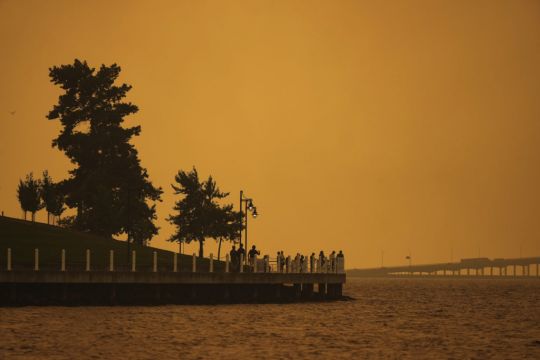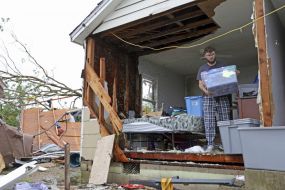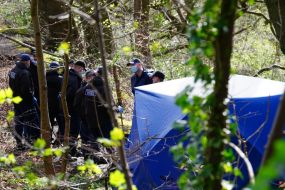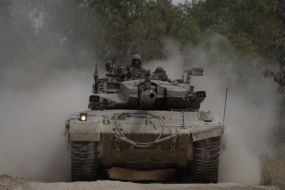Yellowknife, the capital of Canada’s Northwest Territories, is virtually deserted after nearly all the residents of the city of just over 20,000 fled a huge wildfire.
To the south, in British Columbia, thousands more people were told to leave their homes while firefighters battled a growing fire that set homes ablaze.
Officials in the Northwest Territories said that about 19,000 people had left Yellowknife in less than 48 hours, with about 15,000 driving out in convoys and 3,800 leaving on emergency flights.
Mayor Rebecca Alty said: “I described today as another marathon sprint. It’s draining and, unfortunately, it’s not letting up yet.”

About 2,600 people are still in the city – 1,000 of them essential workers, authorities said.
Shane Thompson, the territory’s minister of environment and climate change, said the wildfire situation remains critical and the non-emergency personnel who stayed were endangering themselves and others.
“Please get out now,” he said.
Streets were nearly empty and shops were shuttered. “It’s a ghost town,” said Kieron Testart, who was going door to door in the nearby First Nation communities of Dettah and NDilo to check on people.
A grocery store and a pharmacy remained open on Friday but were expected to close. The last petrol station still operating shut down in the afternoon. One bar was still open, drawing exhausted workers at the end of long shifts.
“It’s kind of like having a pint at the end of the world,” Mr Testart said.

Cooler temperatures and higher humidity helped firefighters keep the wildfire from advancing on Friday, holding it nine miles north-west of the city’s outskirts, fire information officer Mike Westwick said.
“For the first time in a while, we got a little bit of help from weather,” he said.
But he warned that emergency officials still fear weather conditions could change and propel the fire – one of hundreds raging in the territory – to the city limits.
Eleven air tankers bombed water onto the flames and another plane dropped fire retardant. A 10-kilometre (six-mile) fire line was dug, and firefighters deployed 20 kilometres (12 miles) of hose and a plethora of pumps in the fight to keep the fire at bay.
It is “the most extensive heavy water operation we’ve ever seen in the territory,” Mr Westwick said.
The fire, caused by lightning more than a month ago, is about 1,670 square kilometres (644 square miles) and “not going away anytime soon,” Mr Westwick said. He said the blaze had jumped three different containment lines, fuelled by dry weather and dense forests.

Hundreds of miles south of Yellowknife, homes burned in West Kelowna, British Columbia, a city of about 38,000, after a wildfire grew “exponentially worse” than expected overnight, officials said.
Premier David Eby declared a state of emergency for the province because of the rapidly evolving wildfire situation.
“We are in for an extremely challenging situation in the days ahead,” Mr Eby said at a news conference on Friday evening.
He said the decree would give authorities a number of legal tools, including the power to prevent people from traveling into dangerous areas and ensure access to accommodations for evacuees and heavy equipment for fighting the fires.
Officials in West Kelowna already ordered people to evacuate 2,400 properties and alerted an additional 4,800 properties to be ready to leave. The BC Wildfire Service said the fire stretched over 68 square kilometres (26 square miles).

No casualties had been reported, but some first responders became trapped while rescuing people who failed to evacuate, said Jason Brolund, chief of the West Kelowna fire department.
Bowinn Ma, the province’s minister of emergency management, said at a news briefing Friday afternoon that “we are still faced with great challenges”.
“I was deeply horrified to witness the distressing images emerging from West Kelowna,” she said. “The past 24 hours have been incredibly challenging for the people across the province.”
Canada has seen a record number of wildfires this year — contributing to choking smoke in parts of the United States — with more than 5,700 fires burning more than 137,000 square kilometres (53,000 square miles) from one end of Canada to the other, according to the Canadian Interagency Forest Fire Centre.
As of Friday morning, more than 1,000 wildfires were burning across the country, over half of them out of control.
About 6,800 people in eight other communities in the Northwest Territories had already evacuated their homes, including the small community of Enterprise, which was largely destroyed. Officials said everyone made it out alive.







